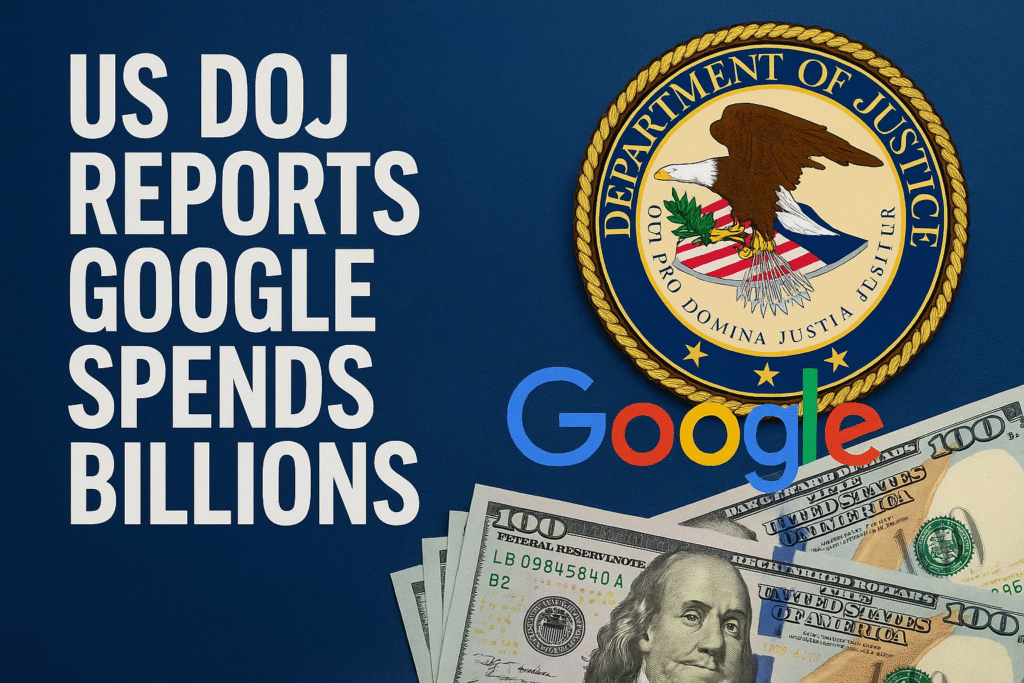Introduction
In recent years, the U.S. Department of Justice (DOJ) has intensified scrutiny of Big Tech companies. Among the most high-profile legal battles is the DOJ’s antitrust case against Google. The crux of the DOJ’s argument: Google has spent vast sums of money in strategic deals and arrangements to lock in its dominance as the default search engine, thereby erecting barriers for competition and violating U.S. antitrust law.
This blog explores the key elements and developments of the case, including how Google allocates billions to maintain its search supremacy, the legal findings against it, the likely consequences, and what this might mean for the future of search competition.
Background: Why the DOJ Sued Google
The DOJ initially filed suit against Google in October 2020. The complaint alleged that Google used exclusionary contracts and default-status agreements to foreclose competition.
Over time, the case evolved through trial (beginning in 2023), and by August 2024, the court ruled that Google had maintained a monopoly in general search and search advertising markets, in violation of Section 2 of the Sherman Act.
In September 2025, the DOJ and Google entered a remedy phase to decide what corrective measures should follow the ruling.
Thus, the backdrop: Google is accused of not just being good at search, but of leveraging its dominance to prevent meaningful competition, via massive spending and restrictive deals.
How Much Is “Billions,” and What Are They For?
The headline figure often cited in the case is that Google spends tens of billions of dollars annually to secure its position as the default search engine on devices, web browsers, and partner platforms.
| Year / Period | Reported Spending / Estimate | Purpose / Target | Notes / Source |
|---|---|---|---|
| 2021 | ~$26.3 billion | Traffic acquisition / default-status payments | The court found Google paid more to secure defaults than it spent on all other search-related expenses combined. |
| 2022 | ~$20 billion (to Apple) | To be default on Safari browser | DOJ’s case states Google paid Apple large sums to be Safari’s default engine. |
| ~2023 / current era | ~$10 billion annually | Deals with device makers, OEMs, browsers | DOJ claimed Google pays ~US$10B per year to Apple and others to preserve default status. |
| Long term / aggregate | Billions over many years | Locking in market share / exclusionary contracts | Through exclusionary agreements and defaults, Google locks out competition. |
Key takeaway from the table: Google’s expenditure is not incidental — it is structural. The court found that the money spent to secure default status on devices and browsers is more than Google’s combined investments in other search-related improvements or features.
Mechanisms: How Google Uses Its Expenditures
Google’s strategy to maintain dominance is multidimensional. Below are the primary mechanisms of how it uses spending and contracts in its favor:
-
Default search agreements
Google negotiates with smartphone manufacturers (e.g., Samsung), browser developers (e.g., Mozilla Firefox), operating systems, and other tech platforms (e.g., Apple) to ensure Google is the preset or default search engine. This means users have to take an extra step if they want to choose another engine. -
Exclusivity clauses / prohibitions on competitors
Some of Google’s contracts prohibit or discourage preinstallation of rival search tools, thereby narrowing distribution channels for challengers. -
Revenue-share deals and payments to partners
Google shares revenue (or commits minimum payments) with device makers or OS providers in exchange for being the default. These deals often compensate partners for any lost income from switching away from Google. -
Traffic acquisition costs (TAC)
Google pays partners or platforms per user query or traffic volume to drive its search volume. These costs are substantial — in 2021 alone, TAC was a multi-billion dollar expense. -
Lock-in effects and “self-reinforcing monopoly”
Because Google is already widely used, it has network effects: more users lead to more data, which improve search relevance, which attract more users. Its spending helps maintain that initial dominance.
Legal Findings: Google Is a Monopolist, and It Acted Illegally
In August 2024, Judge Amit Mehta ruled in favor of the DOJ, concluding that Google had acted as a monopolist and violated Section 2 of the Sherman Act.
-
The court accepted that the market for general search services is a relevant antitrust market. Google’s share in that market was nearly 90% in the U.S. over recent years.
-
On the advertising side, Google also dominates markets like general search text ads and search ads. The DOJ claimed market shares of ~88% and ~74% respectively in those ad markets.
-
The court found that Google “bought preferential treatment” via exclusionary agreements, default locking, and paying for traffic.
-
Importantly, the court noted that:
“Tellingly, Google spends more securing exclusive defaults than on all other search-related expenses combined.”
-
The court also found that Google’s behavior had reduced incentives for innovation, consumer choice, and gave less impetus to protect user privacy.
-
As a result, Google’s dominant position was not merely the product of superior quality, but of anti-competitive practices.
In short: the court deemed Google’s spending and agreements to be part of a lock-in strategy that unlawfully maintained its monopoly.
Repercussions, Remedies, and Reforms
After the liability ruling, the next stage is remedies. What should be done to restore competition? Some possible and proposed remedies include:
| Proposed Remedy | Description | Potential Impact / Challenges |
|---|---|---|
| Ban or limit exclusive default contracts | Prevent Google from striking deals that make it the only default option | Could open up device/browser choice |
| Force Google to share search data / APIs with rivals | Allow competitors access to performance data or infrastructure | Privacy, implementation complexity risks |
| Divest parts of the business (e.g., Chrome, or search arm) | Break up Google’s integrated operations | Highly controversial, massive disruption |
| Structural oversight (monitoring, reporting) | Regulatory oversight, audits, transparency requirements | Less disruptive, but may be weaker |
| Open index / mandated interoperability | Require all search engines to use shared indexing or data access | Encourages competition, but technically complex |
Consumer Reports and other advocacy groups have analyzed multiple alternatives to restore competition.
In May 2025, a 15-day remedies trial was held to consider these options. In September 2025, the DOJ reported progress: the court has imposed restrictions on how Google can distribute its services and required it to share search data with rivals.
Google, in response, expressed concerns about user privacy, and noted that the court declined to force divestiture of Chrome or Android.
One ruling (by Judge Mehta) stopped short of banning all multi-billion dollar default deals, but forced limits and potential breakups.
In short: the remedy phase is ongoing, and the final outcome may take years, including appeals.
Critiques, Counterarguments & Google’s Defense
Google has mounted a vigorous defense:
-
“We win by merit” argument: Google claims that it is chosen by users not due to contracts, but because it offers superior search quality, speed, relevance, and features.
-
Google disputes that its default deals are anti-competitive, saying they are standard commercial arrangements.
-
On privacy concerns: Google argues that forced sharing of search data with rivals would compromise user privacy and security.
Legal and academic critiques of the DOJ’s case note complexities:
-
Defining the market
Critics argue that “general search” may be too narrow a definition, ignoring substitutes like vertical search (Amazon, maps) or AI assistants. -
Causation vs correlation
Just because Google has high market share and spends heavily does not automatically mean its dominance is illegal. Proving that rivals would succeed absent those barriers is difficult. -
Implementation and unintended consequences
Remedies may backfire if they hinder investment or innovation. Overly aggressive breakups might hurt consumers or fragment the ecosystem.
Still, the court’s findings show strong evidence of anti-competitive behavior and that Google’s default deals were more than mere strategic marketing—they were an integral lever in locking out competition.
Broader Implications for Search and Tech
This case is not just about Google. The outcome could reshape how we think about competition in digital markets, including:
-
Search markets & AI competition
As rivals (e.g., Microsoft’s Bing, OpenAI, Perplexity) push into search/AI, removing Google’s default advantage may level the playing field. -
Data access and interoperability
Mandating data access or interoperability may become a template for regulating other platforms (social media, ad networks, app stores). -
Precedents for antitrust enforcement in Big Tech
The case signals renewed vigor in U.S. federal antitrust enforcement, putting companies like Amazon, Meta, and Apple under more scrutiny. -
Impact on device ecosystems
OEMs and browser makers may be less able to lock in single services; consumers could gain more choice in defaults. -
International echoes
Regulators globally (EU, India, etc.) may take lessons. Indeed, the EU has imposed multiple antitrust penalties on Google in areas like Shopping, Android, and AdSense.
Thus, the Google case could mark a turning point in how digital platform dominance is regulated in the 21st century.
Challenges and Open Questions
While the DOJ’s arguments appear persuasive to many, several open questions remain:
-
How to measure remedy effectiveness?
If Google is forced to share data or limit default deals, how will courts monitor whether competition truly increases? -
Will users actually switch?
Even with choice, many users may never change defaults. The “default inertia” is strong. -
Privacy vs openness tradeoffs
Opening up data or APIs must consider user privacy, security, and safeguarding proprietary algorithms. -
Appeals and legal delays
Google will appeal, and the judicial process is slow. Any changes may be delayed years. -
Global coordination
Harmonizing U.S. decisions with global regulators will be intricate, especially where rules differ.
Summary & Outlook
The DOJ’s case against Google represents one of the most consequential antitrust battles of the modern era. The evidence presented shows that Google has systematically invested billions in default deals and exclusionary arrangements to entrench its search dominance—spending more on securing defaults than on all other search investments combined.
The court’s ruling that Google acted as a monopolist marks a decisive victory for regulators, but the real test lies ahead: remedying the imbalance and restoring competition without stifling innovation.
If the remedies phase leads to enforced openness, shared data, or constraints on default deals, the door could open for renewed competition in search and AI-driven discovery. And that change could ripple across the broader digital ecosystem.
However, the legal, technical, and economic challenges are formidable. The final outcome may not appear for many years, and much will depend on future rulings, appeals, and how regulators and the industry adapt.

